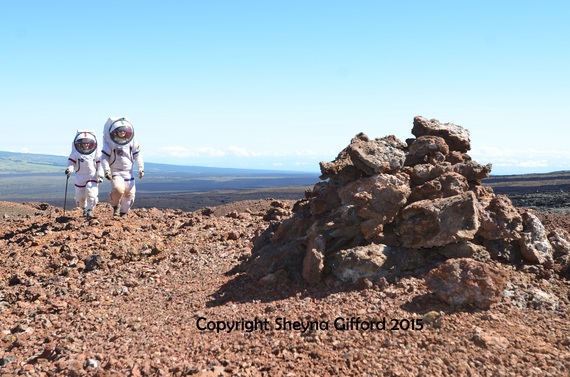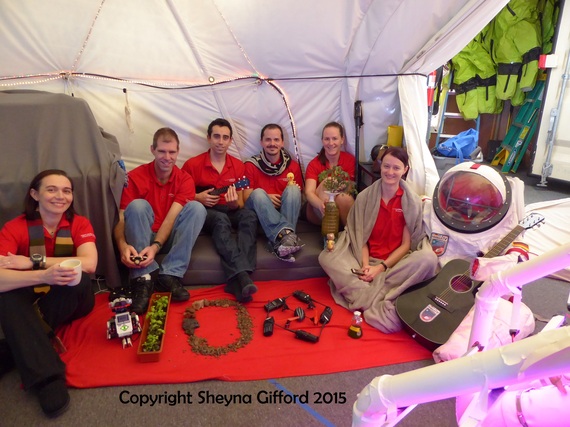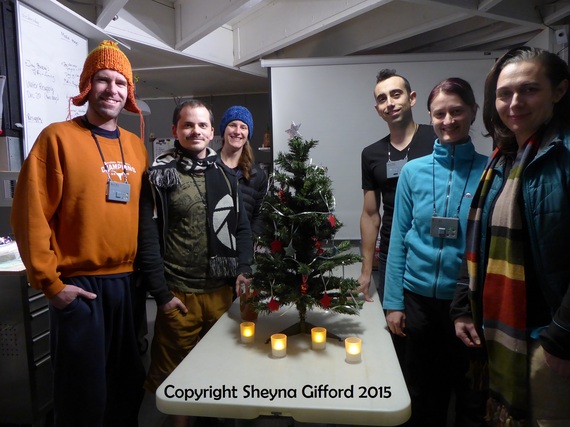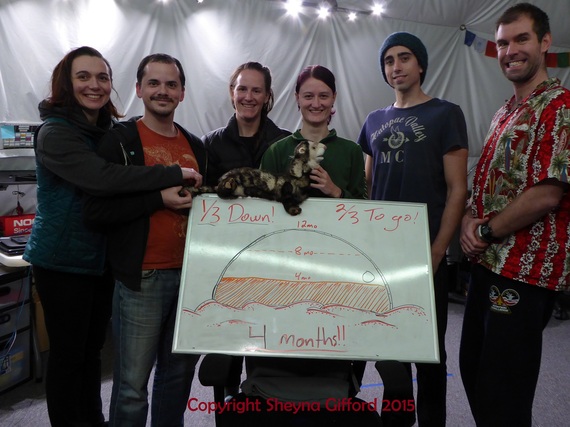Where were you a year ago? Were you better off? Worse off? In a different city, a different country? Not yet in a relationship, about to be a parent, learning you had to say goodbye to someone who is now gone? Just setting out on a journey, or just returning?
Change happens daily, hourly, yet the magnitude of it lies in wait like a song slowly rising to a crescendo. Then, as the year ends, it hits a high note, and you think, "Where did THAT come from?" I look back over the last ~364.25 days at and see so many differences from the year before it's hard to pick out the individual changes. Like the notes in a song, they all blur together. Some phrases do stand out, however: new themes, transitions, sudden changes in rhythm and tempo, and, of course, the surprise endings.
Surprise! Someone I've known since she was a tiny baby went to college - on a full scholarship, no less - with a self-described mission is to end human trafficking. Way to go Clare! 18 years ago, when you were born, I was the age you are today, and not nearly as directed. You'll make the world a better place, I know. Speaking of born, three fresh-baked humans joined my fold this year. This is a big deal for anyone, but particularly in a group like mine, which doesn't make new people all that often. You three are the children of doctors and engineers. We'll see to it that you have the best of everything. The world is already a better place because you are in it.
18 years ago, where was I? Funny enough, working on Mars Suit design at UC Berkeley. I was in excellent company, and I still know many people from that epoch of space-time. The fact that we're still working on Mars suit design, a generation later, should say something about the scale of these endeavors.
Rome wasn't built in a day, and these days, we don't colonize planets in a decade or two. The pace at which we're going interplanetary seems exasperatingly slow at times. We haven't dedicated ourselves to interplanetary travel in a way that's forced innovation's hand (for better and worse, we've had other ambitions). The even greater truth - the one that keeps me going 18 years later - is the abundant evidence that we are capable of tipping the scales of creation towards almost any end, including colonizing another planet. Since I graduated from college, radical technological acceleration has occurred in places that matter to people in their daily lives: smart phones, smart cars, touch-screen tablets, 128 GB SD cards in 250 megapixel cameras, reusable orbital rockets, hollow organs grown in labs, with solid organs coming up behind them. I look at our suit design and think, "If you were a consumer item, you would have been built yesterday."
Similarly, I look at Mars and think: if we wanted to be there, we would be there. It's not that easy, but in many ways it is that simple. Will breeds resources like money and manpower, which have been lacking in the scale required to launch a manned mission. After decades of lukewarm warm-ups and false-starts, it feels as though the will to make this interplanetary masterpiece a reality is rising, becoming tangible, and preparing to make its grand debut. It feels good. Whatever else space travel is - a Herculean labor, a implacable challenge, a conundrum, an immense investment at all levels - the ongoing attempt to become interplanetary is authentically human. It has always sounded like us.
Speaking of ongoing attempts, this time last year, I was halfway through something else I'd been plugging away at for a couple of decades: a degree in journalism. My very first science article ran in The Daily Californian in 1997 (a full-page piece on Comet Hale-Bopp). That I could finally pursue this degree was entirely due to the profound generosity of Thomas Campbell Jackson, the man who produced Particle Fever. He put me through school so that I could better communicate how science makes the world a better place. In the process, I met two dozen incredible people. I never would have known these women. Yes, my USC Masters of Journalism class was all female. Today, I can't imagine my life without them. First, because they are outstanding writers. You can judge for yourself by following these links. Second, because we're all here to make journalism great, which is to say, our collective goal is to turn information into useful and pertinent knowledge in order to increase the world's net intelligence. You can never know enough people like that. Lastly, for a whole nine months, I was neither the strongest-willed nor the most outspoken person in the room. It was unspeakably refreshing. Every one of them is out there, right now, being awesome.
This year, I also thank the Universe for everyone's health. I have 4 grandparents over the age of 90, two friends being actively treated for cancer, and several hundred good friends scattered across the face of the Earth. Bless it, NOBODY died. STRONG work, people! It was a good year for that, with one exception. We take a moment to think of Victor, a young man, and a very funny one, gone too soon. They played Amazing Grace on the ISS for you, my friend. Hail and farewell.
I met Victor when I took my first, and, it turned out, pivotal step into simulated space. This year, thanks to HERA, I learned something about piloting a space plane...and how it makes your fellow mission specialist laugh out loud when you keep your promise to crash it before the simulation is done. The commander for our HERA IV mission, Ethan, is standing in NASA mission control right now, helping payloads make their way to the ISS. The mission specialist who laughed at me is very gamely on mission control for my current mission, HI-SEAS IV. The flight engineer from that mission is... currently downstairs talking to our space architect about art, software integration, and - hold on - a movie called Sharknado 2. Like most sounds in this 1,200 square foot dome, the voices of my crewmates - Andrzej Stewart, Tristan Bassingthwaighte, Carmel Johnston, Christiane Heinicke, and Cyprien Verseux - resonate up the stairwell, straight through my thin plywood door, and into my 9x5x7 foot bunk. While writing this post, my background music has been the sound of their laughter. In a minute or two, I'll go down, say hi, and head to the kitchen to see about rehydrating lunch.
All this is possible, as I've mentioned, through generosity, a lot of luck, and no small amount of forgiveness. Forgiveness, especially. There are things we've all wanted for ourselves and for the world - things we've been unable to produce or provide, in spite of repeated attempts and a fantastic amount of effort. Some of these were small: losing a few pounds; finishing a certain book. On the other end of the spectrum stand massive undertakings like Mars suits and Mars missions. We have big dreams and small, and disappointment to suit all sizes. In order for hope to carry us forward and see those dreams made into reality, we first have to forgive the fact that, so far, we haven't succeeded. This is true for everything from losing weight to launching rockets. Scorched launchpads at Cape Canaveral serve as memorials to missions attempted and lives lost. We had to forgive those failures, or we would never launched another mission. We would have stopped reaching for the stars altogether.
Clare, now in college on a full scholarship, lost her parents to drugs and alcohol. She kept going. Ethan has been watching for years as payloads launched to the ISS, and stays on mission control no matter how many miss their mark, crash, and burn. It took a lot of time and a lot of forgiveness to become a doctor-journalist on a simulated Mars mission. This is where I was trying to get to all those years. It's a better place than I was in even a year ago. I hope that wherever this finds you, you are better off in some way than you were last year - closer to the place you most want to be. If not, in 2016, may grace, good fortune, and forgiveness conspire to bring to you the place you've been trying to reach, and beyond.
1/3 of the mission down - 2/3 to go! Plus, a new member of the crew: Raspberry the plush ferret.
Ne'ilah by Marge Piercy, courtesy of The Poetry Foundation
The hinge of the year
the great gates opening
and then slowly slowly
closing on us.
I always imagine those gates
hanging over the ocean
fiery over the stone grey
waters of evening.
We cast what we must
change about ourselves
onto the waters flowing
to the sea. The sins,
errors, bad habits, whatever
you call them, dissolve.
When I was little I cried
out I! I! I! I want, I want.
Older, I feel less important,
a worker bee in the hive
of history, miles of hard
labor to make my sweetness.
The gates are closing
The light is failing
I kneel before what I love
imploring that it may live.
So much breaks, wears
down, fails in us. We must
forgive our broken promises--
their sharp shards in our hands.



